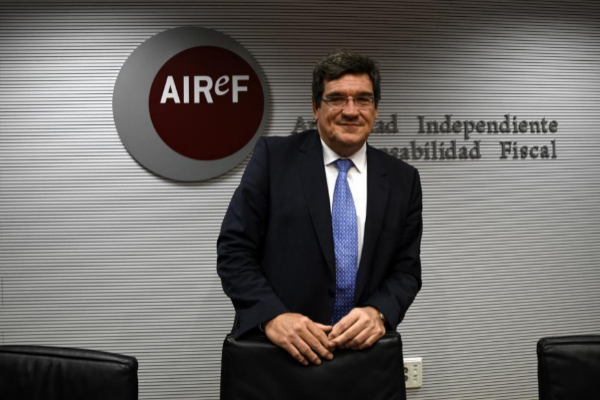- Politics: Pedro Sánchez reformulates Foreign Affairs and appoints Arancha González Laya as new minister
- Politics: These are the ministers and vice presidents of the new Government of Pedro Sánchez
The new Government continues to disclose the names that will occupy the portfolios of its cabinet and one of the biggest unknowns was who would put the head of Social Security after breaking it from the Ministry of Labor. Although everything seemed to point to Magdalena Valerio as head of the department, Moncloa has confirmed this Friday that it will be José Luis Escrivá Belmonte , until now president of the Independent Authority for Fiscal Responsibility ( AIReF ), who will head the Ministry of Social Security, Inclusion and Migrations .
Escrivá, who will be one of the independent members of the new Cabinet, will have among its challenges at the head of the Ministry the repeal of the 2013 pension reform, the increase in the income of the Social Security system, and the coordination of a formula that guarantees the sustainability of future pensions.
The election of José Luis Escrivá to lead in the next legislature the new Ministry of Social Security means putting at the head of the bulk of social spending a technician who must lead with a lot of political glove which is next to the reduction of the deficit and volume debt, the biggest economic problem facing the State, pension reform.
Escrivá's technical capacity is beyond doubt. He has passed through the Studies Department of the Bank of Spain, the European Central Bank and the International Bank for Payments and then crossed into the private sector as head of the BBVA studies service and returned to the public area with the presidency of the Independent Authority of Fiscal Responsibility (AIReF), an organization created in 2013 at the request of the European Union to carry out a marking on the control of the government's public accounts. His appointment was made by the then Minister of Finance and responsible for the longest budgets in the history of Spain, the popular Cristóbal Montoro, who relied on Escrivá for the supervision of the economic policies of the government of Mariano Rajoy.
In this sense, its activity has been intense, with frequent friction with the Administration on account of compliance with the reduction of the deficit in the central and regional Administration. Also with regard to the provision of means with which to carry out its surveillance mission and with regard to pensions.
His point of view in this regard is that we have to get down to work with an agreement that brings the system afloat , something that is consistent with most experts. But his appointment means that he will have to take a measure such as the revaluation of pensions with the CPI promised by Pedro Sánchez before the elections and of application in the next Council of Ministers, which is not his.
Rather the complete opposite. The new Minister of Social Security has already warned that it will mean an additional expenditure increase of 0.7% of GDP in 2023, the equivalent of some 9,000 million more and that this expense will be absorbable as long as economic growth is maintained of recent years, something that does not seem possible now. In other areas such as the rise of the SMI, it has qualified its initial opposition to the increase that the Government applied last year to 900 euros, although it seems difficult to endorse the proposal of Podemos to raise it to 1,000 euros in 2020.
According to the criteria of The Trust Project
Know more
